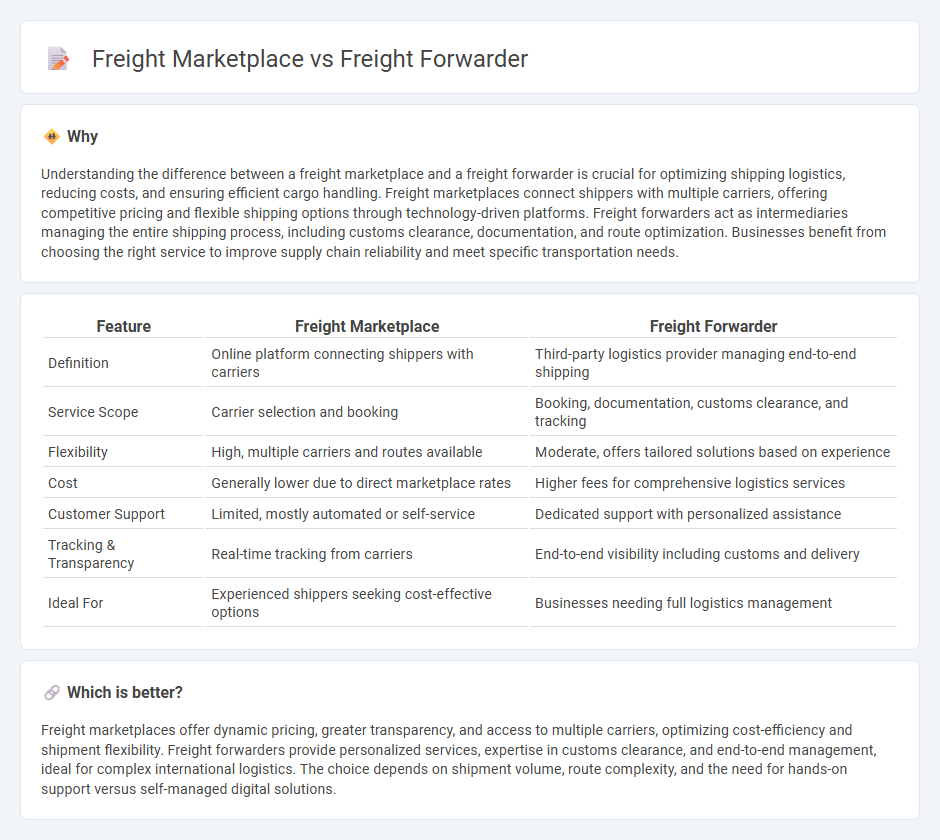
A freight marketplace connects shippers and carriers through an online platform, enabling direct booking and real-time price comparisons to optimize shipping efficiency. Freight forwarders act as intermediaries managing the entire logistics process, including customs clearance, documentation, and route planning for businesses. Discover how choosing between a freight marketplace and a freight forwarder can transform your supply chain strategy.
Why it is important
Understanding the difference between a freight marketplace and a freight forwarder is crucial for optimizing shipping logistics, reducing costs, and ensuring efficient cargo handling. Freight marketplaces connect shippers with multiple carriers, offering competitive pricing and flexible shipping options through technology-driven platforms. Freight forwarders act as intermediaries managing the entire shipping process, including customs clearance, documentation, and route optimization. Businesses benefit from choosing the right service to improve supply chain reliability and meet specific transportation needs.
Comparison Table
| Feature | Freight Marketplace | Freight Forwarder |
|---|---|---|
| Definition | Online platform connecting shippers with carriers | Third-party logistics provider managing end-to-end shipping |
| Service Scope | Carrier selection and booking | Booking, documentation, customs clearance, and tracking |
| Flexibility | High, multiple carriers and routes available | Moderate, offers tailored solutions based on experience |
| Cost | Generally lower due to direct marketplace rates | Higher fees for comprehensive logistics services |
| Customer Support | Limited, mostly automated or self-service | Dedicated support with personalized assistance |
| Tracking & Transparency | Real-time tracking from carriers | End-to-end visibility including customs and delivery |
| Ideal For | Experienced shippers seeking cost-effective options | Businesses needing full logistics management |
Which is better?
Freight marketplaces offer dynamic pricing, greater transparency, and access to multiple carriers, optimizing cost-efficiency and shipment flexibility. Freight forwarders provide personalized services, expertise in customs clearance, and end-to-end management, ideal for complex international logistics. The choice depends on shipment volume, route complexity, and the need for hands-on support versus self-managed digital solutions.
Connection
Freight marketplaces connect shippers with freight forwarders by providing a digital platform where carriers, freight forwarders, and customers can easily find, compare, and book transportation services. Freight forwarders leverage these marketplaces to optimize route planning, negotiate competitive rates, and manage complex logistics chains efficiently. This integration streamlines supply chain processes, reduces transportation costs, and enhances real-time shipment visibility for all stakeholders.
Key Terms
Intermediary
A freight forwarder acts as an intermediary by managing logistics, booking cargo space, and handling customs documentation on behalf of shippers, ensuring seamless transportation from origin to destination. In contrast, a freight marketplace serves as a digital intermediary platform connecting shippers directly with carriers and freight forwarders, enabling real-time price comparisons and efficient booking processes. Explore the differences in intermediary roles to optimize your supply chain strategy effectively.
Digital Platform
Freight forwarders traditionally manage cargo shipments by coordinating with carriers, handling documentation, and offering end-to-end logistics solutions, while freight marketplaces operate as digital platforms connecting shippers directly with carriers for competitive pricing and transparent service options. Digital platforms utilize advanced algorithms and real-time tracking to optimize shipment routing, reduce costs, and increase efficiency in logistics operations. Explore our detailed comparison to understand how digital freight solutions can transform your supply chain management.
Service Scope
Freight forwarders offer end-to-end logistics services including customs clearance, cargo insurance, and personalized shipment management, addressing complex supply chain needs. Freight marketplaces primarily facilitate price comparison and booking by connecting shippers with multiple carriers, focusing on transparency and cost efficiency rather than comprehensive service. Explore detailed comparisons and service offerings to determine the best fit for your shipping requirements.
Source and External Links
Freight Forwarders: A Comprehensive Guide, Updated For 2025 - Crowley Logistics - A freight forwarder is a company that specializes in arranging cargo transport on behalf of shippers, managing services such as ocean or air freight, inland transportation, documentation, warehousing, and customs compliance to facilitate import and export logistics.
Freight Forwarder - CEVA Logistics - Freight forwarders handle logistics and organizational aspects of goods transport, using expertise to choose efficient, economical transit solutions, and operate under regulated standards with varied modes like maritime, air, road, or rail transport.
Freight Forwarding Services | UPS Supply Chain Solutions - Freight forwarders do not move goods themselves but contract carriers and act as experts managing shipments, offering services that simplify freight shipping, optimize supply chains, and provide tracking and booking through platforms like the UPS Forwarding Hub.
 dowidth.com
dowidth.com